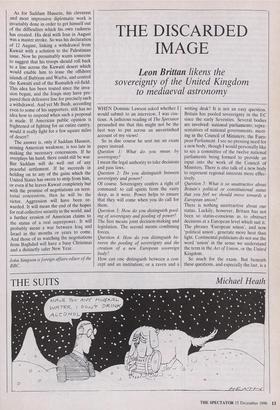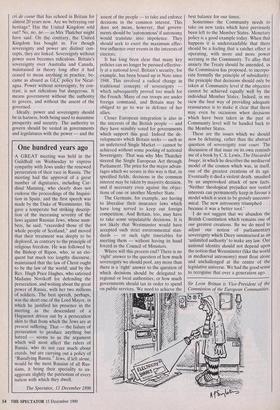THE DISCARDED IMAGE
Leon Britton likens the
sovereignty of the United Kingdom to mediaeval astronomy
WHEN Dominic Lawson asked whether I would submit to an interview, I was cau- tious. A judicious reading of The Spectator persuaded me that this might not be the best way to put across an unvarnished account of my views!
So in due course he sent me an exam paper instead.
Question 1: What do you mean by sovereignty?
I mean the legal authority to take decisions and pass laws.
Question 2: Do you distinguish between sovereignty and power?
Of course. Sovereignty confers a right of command: to call spirits from the vasty deep, as it were. Power helps to ensure that they will come when you do call for them.
Question 3: How do you distinguish pool- ing of sovereignty and pooling of power? The first means joint decision-making and legislation. The second means combining forces.
Question 4: How do you distinguish be- tween the pooling of sovereignty and the creation of a new European sovereign body?
How can one distinguish between a con- cept and an institution; or a raven and a writing desk? It is not an easy question. Britain has pooled sovereignty in the EC since the early Seventies. Several bodies are involved: national parliaments; repre- sentatives of national governments, meet- ing in the Council of Ministers; the Euro- pean Parliament. I see no pressing need for a new body, though I would personally like to see a committee of the twelve national parliaments being formed to provide an input into the work of the Council of Ministers. There is also talk of a new body to represent regional interests more effec- tively.
Question 5: What is so unattractive about Britain's political or constitutional status that you feel we should move towards a European union?
There is nothing unattractive about our status. Luckily, however, Britain has not been so . status-conscious as to obstruct decisions at a European level which suit it. The phrases 'European union', and now 'political union', generate more heat than light. Continental politicians do not use the word 'union' in the sense we understand the term in the Act of Union, or the United Kingdom.
So much for the exam. But beneath these questions, and especially the last, is a
cri de coeur that has echoed in Britain for almost 20 years now. Are we betraying our heritage? Has the United Kingdom sold out? No, no, no — as Mrs Thatcher might have said. On the contrary, the United Kingdom has bought in. For though sovereignty and power are distinct con- cepts, they are linked. Sovereignty without power soon becomes ridiculous. Britain's sovereignty, over Australia and Canada, maintained in theory long after it had ceased to mean anything in practice, be- came as absurd as GLC policy for Nicar- agua. Power without sovereignty, by con- trast, is not ridiculous but dangerous. It means government without the authority to govern, and without the assent of the governed.
Ideally, power and sovereignty should be in harness, both being used to maximise prosperity and security. The authority to govern should be vested in governments and legislatures with the power — and the assent of the people — to take and enforce decisions in the common interest. This does not mean, however, that govern- ments should be 'autonomous' if autonomy would translate into impotence. They should seek to exert the maximum effec- tive influence over events in the interests of electors.
It has long been clear that many key policies can no longer be pursued effective- ly at a national level. Britain's security, for example, has been bound up in Nato since 1948. This involved a radical change in traditional concepts of sovereignty — which subsequently proved too much for the French. Many of our troops are under foreign command, and Britain may be obliged to go to war in defence of her allies.
Closer European integration is also in the interests of the British people — and they have sensibly voted for governments which support this goal. Indeed the de- velopments which Britain seeks — such as an unfettered Single Market — cannot be achieved without some pooling of national Sovereignty. That was why Mrs Thatcher steered the Single European Act through Parliament. The price for the major advan- tages which we secure in this way is that, in specified fields, decisions in the common interest may be taken by majority decision, and if necessary even against the objec- tions of one or another Member State.
The Germans, for example, are having to liberalise their insurance laws which have long served to keep out foreign competition. And Britain, too, may have to take some unpalatable decisions. It is not likely that Westminster would have accepted such strict environmental stan- dards — or such tight timetables for meeting them — without having its hand forced in the Council of Ministers.
Where will this process end? There is no 'right' answer to the question of how much sovereignty we should pool, any more than there is a 'right' answer to the question of which decisions should be delegated to regional or local authorities; or how much governments should tax in order to spend on public services. We need to achieve the best balance for our times.
Sometimes the Community needs to take on new tasks which have previously been left to the Member States. Monetary policy is a good example today. When that happens it is understandable that there should be a feeling that a ratchet effect is operating, with more and more power accruing in the Community. To allay that anxiety the Treaty should be amended, as the Commission has proposed, to incorpo- rate formally the principle of subsidiarity: the principle that decisions should only be taken at Community level if the objective cannot be achieved equally well by the individual Member States. Indeed, in my view the best way of providing adequate reassurance is to make it clear that there may even be occasions when decisions which have been taken in the past at Community level will be handed back to the Member States.
These are the issues which we should now be debating, rather than the abstract question of sovereignty tout court. The discussion of that issue on its own reminds me of a book by C.S. Lewis, The Discarded Image, in which he describes the mediaeval model of the cosmos which was, in itself, one of the greatest creations of its age. Eventually it died a violent death, smashed by an unprovoked attack of new facts. 'Neither theological prejudice nor vested interests can permanently keep in favour a model which is seen to be grossly unecono- miCal. The new astronomy triumphed . . • because it was a better tool.'
I do not suggest that we abandon the British Constitution which remains one of our greatest creations. Be we do need to adjust our notion of parliamentary sovereignty which Dicey summarised as an 'unlimited authority' to make any law. Our national identity should not depend upon the notion that Westminster (like the world in mediaeval astronomy) must float alone and unchallenged at the centre of the legislative universe. We had the good sense to recognise that over a generation ago.
Sir Leon Brittan is Vice-President of the Commission of the European Communities.



























































 Previous page
Previous page